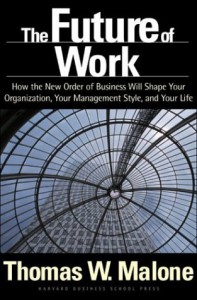 Traditionally, power has been held by those at the top and delegated down to those who hold less and less influence. In The Future of Work, Thomas Malone shows how, now more than ever, organizations are breaking down these traditional hierarchies to form new power structures. These new organizations are guided by group insight and self-determination and foster healthier environments where work is more supportive of human values like creativity, freedom and esteem in one’s work. The book gives examples of these new forms of business, specific contexts where they’re most likely to succeed, and explains how to apply them in your entrepreneurial efforts.
Traditionally, power has been held by those at the top and delegated down to those who hold less and less influence. In The Future of Work, Thomas Malone shows how, now more than ever, organizations are breaking down these traditional hierarchies to form new power structures. These new organizations are guided by group insight and self-determination and foster healthier environments where work is more supportive of human values like creativity, freedom and esteem in one’s work. The book gives examples of these new forms of business, specific contexts where they’re most likely to succeed, and explains how to apply them in your entrepreneurial efforts.
Shift to Decentralized Power
We’ve seen this shift towards decentralized power before– in the upset of traditional government and the conception Modern Democracy. According to Malone, the printing press was the catalyst responsible for the shift because it made it easy and cheap to popularize the ideas behind it. The Future of Work is a discussion of modern catalysts and their effects. Malone breaks down Coordination Theory which explains the way cheaper and more efficient communication can bring about the decentralization of power from within an organization, and what it implies for, you guessed it, the future of work.
Through writing which is as captivatingly passionate to read as it must have felt for him to write, Malone takes his work in stride, avoids zealousness, and gives readers a calm, perceptive look at the seismic reorientation of business that is taking place as today’s commerce adapts to fresh technologies.
My Perspective
Personally, I thought this was one of the more novel books I’ve read recently. Malone produces conclusions similar to what Ori Brafman gives in his The Starfish and the Spider, but Malone goes deeper into the forces and circumstance that shape decentralized organizations. As a result, the lessons in The Future of Work much more easily understood and in turn re-applied.
To me, the book was a healthy dose of perspective. I’ve been able to sort out a more efficient structure for my latest startup, freeing a lot of time for my employees and myself while reducing our collective headache. Decentralization is very important to building your own money machine, because it doesn’t funnel all responsibility (and all stress) back up to you. By making a machine that’s decentralized, most of the decisions and hassle will be worked out by the organization itself before word of a problem ever needs to reach you. The Future of Work offers an interesting perspective on business in the modern world, and deserves a spot on your bookshelf.
Could your startup benefit from decentralization? If you’ve tried it, share your story and what you found the sticking points to be, or just let us know what you thought of The Future of Work.
Jordan Feldstein is a friend to all, lover to few, who hopes his writing shows people what’s within reach when you’re willing to think and operate outside the norm. He believes that education should be used to open minds not train workers, that technology should simplify life and that music can free the soul. Now building his second company, Jordan is waiting to turn 21 to have a beer with you.
Related Post: 6 Secrets to Creating a Bad-Ass Company Culture



